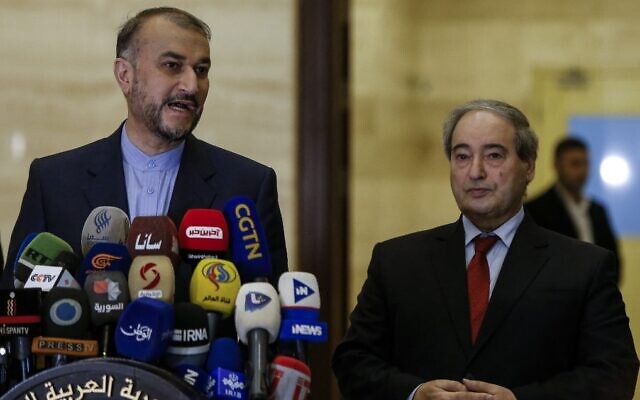Iranian Foreign Minister Hossein Amir Abdollahian has highlighted Tehran’s links with Syria, amid Russia’s invasion of Ukraine and talks on a renewed Iran nuclear deal, by visiting Damascus.
Just after a trip to Moscow, Amir Abdollahian met with Syrian leader Bashar al-Assad and with Foreign Minister Faisal al-Mikdad.
Little of substance was offered by Syrian or Iranian State media, with wordy platitudes about discussions of “files of the standing cooperation between the two countries and efforts exerted by the two sides to follow up implementation of the bilateral agreements, particularly in economic and commercial fields, despite of the illegitimate unilateral measures imposed by the west on both countries”.
Amir Abdollahian did tip off the ongoing urgency of economic problems in both Syria and Iran amid internal difficulties, the damage of the 11-year Syrian conflict, and US-led sanctions: “We are talking about strategic ties and today, aside from all the dimensions of our relationship, the issue of economic relations is the priority.”
He welcomed Assad’s visit to the UAE last Friday, hailing efforts by some Arab states to “normalize relations” with the Assad regime after its 11-year violent suppression of opposition.
Assad Visits UAE in 1st Trip to Arab State Since 2011
He also issued an anodyne statement about the Vienna talks over the 2015 nuclear agreement, which were reportedly near resolution before the February 24 invasion of Ukraine by Russia.
If the US acts pragmatically, we are ready to have foreign ministers of countries belonging to the nuclear deal’s joint commission gather in Vienna to finalize the agreement.
We believe that today we are closer to an agreement in Vienna than ever before.
US officials said Tuesday that a conclusion is not imminent, as issues remain among Iran, the US, and the other 5+1 Powers (UK, France, Germany, China, and Russia).
One of those issues is the removal of Iran’s Revolutionary Guards from the US list of terrorist groups.
The Guards were added to the list in April 2019.
The Biden Administration has reportedly offered to lift the designation in return for a public commitment by Iran to de-escalation in the Middle East. Tehran has suggested a private letter to Washington.


“…Iran’s Technical & Engineering Service Exports Rose 400% In 2021…”
EXCELLENT, AWESOME!!!!
Sanctions have catapulted to greatness, lets keep them.
Are Iranian Sanctions Working? Iran’s Technical & Engineering Service Exports Rose 400% In 2021: https://www.silkroadbriefing.com/news/2022/03/22/are-iranian-sanctions-working-irans-technical-engineering-service-exports-rose-400-in-2021/
“Iran has adapted in three years to SWIFT disconnection and forged ahead with new trade and cooperation agreements.”
Varharan,
Yeah, that’s a PR piece from Iranian officials and Fars — there is no way to verify the actual level of technical and engineering service exports for 2020 (when they would have dipped during the pandemic) and 2021.
But even if the figure of $2 billion for 2021 is accurate, it’s still quite low. Note that Iranian officials were declaring last November that “the country has the potential of exporting technical and engineering services worth $25 billion in a year”.
S.
Yes, it could be much higher, but the fact that Iran’s non-oil exports of products and services is rising in spite of the most draconian sanctions ever put in place shows that the sanctions regime is unsustainable and Iran is breaking out. The biggest outcome of sanctions has been for Iran to drop the dollar in its international trade and use its own banking mechanisms.
Varharan,
Well — if the figures are true — it’s rising in relation to the drop in 2020 because of the pandemic. And dropping the dollar in international trade is not exactly a solid short- and medium-term approach for economic growth.
S.